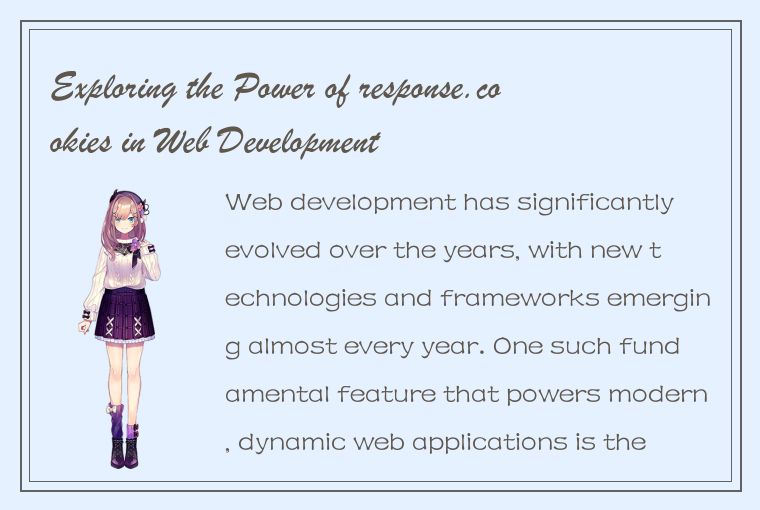Web development has significantly evolved over the years, with new technologies and frameworks emerging almost every year. One such fundamental feature that powers modern, dynamic web applications is the use of cookies. In this article, we will delve into exploring the power of response.cookies in web development.

Cookies have been around for decades, and they enable web developers to store small amounts of data on the client-side. The primary purpose of cookies is to store user-specific information, such as login credentials, preferences, and historical data, among others.
HTTP cookies work in a straightforward manner: the web server sends a cookie (along with the HTTP response) to the client. The client, in turn, stores the cookie and sends it back to the server with every subsequent request to the same domain. This process facilitates the retention of authentication data across different web pages and delivers personalized user experiences by remembering users’ preferences.
The Response Object
In web programming, the server’s role is to respond to the client’s requests. In a typical HTTP response, the server returns a response object that contains HTTP status codes, headers, and, of course, the response content. The response object is an instance of the response class, which encapsulates the server’s response.
In the context of cookies, the response object has an additional property that enables developers to add cookies to the HTTP response. This property is called response.cookies, and it allows the developer to set, modify, or delete cookies from the server’s response.
Response.cookies Syntax
The response.cookies syntax is straightforward and easy to understand. The syntax consists of a dictionary-like object that maps the cookie’s name to its value. Assuming a Flask-based web application, the syntax looks like this:
from flask import Flask, Response
app = Flask(__name__)
@app.route("/")
def index():
response = Response("Hello, World!")
response.cookies['username'] = 'John'
response.cookies['user_id'] = '100'
return response
In the code snippet above, we define a simple Flask app that returns a “Hellow, World!” message. We create a response object and add two cookies to the response object: username and user_id.
By default, the cookie is session-based, meaning that it expires when the user closes the browser. However, developers can configure the cookie’s expiry time, domain, and security options by explicitly setting the cookie’s attributes.
Setting Cookie Attributes
As previously mentioned, cookies have attributes that developers can define to control the cookie’s behavior. These attributes include the cookie’s expiry time, domain, path, and security options. Here’s an example of how to set cookie attributes:
from flask import Flask, Response
app = Flask(__name__)
@app.route("/")
def index():
response = Response("Hello, World!")
response.cookies['username'] = 'John'
response.cookies['user_id'] = '100'
response.cookies['username']['expires'] = 3600
response.cookies['user_id']['domain'] = '.example.com'
response.cookies['user_id']['secure'] = True
return response
In the above code snippet, we set the “username” cookie’s expiry time to one hour from the cookie’s creation time. We also set the “user_id” cookie’s domain to “.example.com,” which means that the cookie will be accessible across all subdomains of the example.com domain.
Lastly, we set the “user_id” cookie’s secure attribute to true, which means that the cookie will only be sent over an HTTPS connection.
Using cookies in web development
Now that we know how to add cookies to HTTP responses let’s explore how we can use cookies in web development. Cookies enable developers to deliver personalized user experiences, enhance security, and facilitate user authentication.
One of the primary use cases of cookies in web development is user authentication. When a user logs in to a web application, the server creates a session cookie that identifies the user. The server then stores the session cookie on the client-side and sends it back to the server with every subsequent request. This process enables the server to identify the user and deliver personalized content based on their preferences.
Another use case of cookies in web development is tracking users’ behavior on the website. Websites use cookies to collect data on users’ browsing behavior, such as the pages they visit, the links they click, and the time spent on the website. This data helps website owners to understand their users’ preferences and tailor the website content to suit their needs better.
Conclusion
In conclusion, cookies are a powerful tool in web development that enable developers to store small pieces of data on the client-side. Flask, Django, and other web frameworks provide developers with easy-to-use tools such as the response.cookies syntax that enable them to add cookies to HTTP responses and set custom cookie attributes.
Cookies are widely used for user authentication, tracking user behavior, and delivering personalized user experiences. However, developers must use cookies responsibly to avoid security breaches and protect user privacy. With these principles in mind, we can safely explore the power of response.cookies in web development and build robust, secure, and user-centric web applications.




 QQ客服专员
QQ客服专员 电话客服专员
电话客服专员